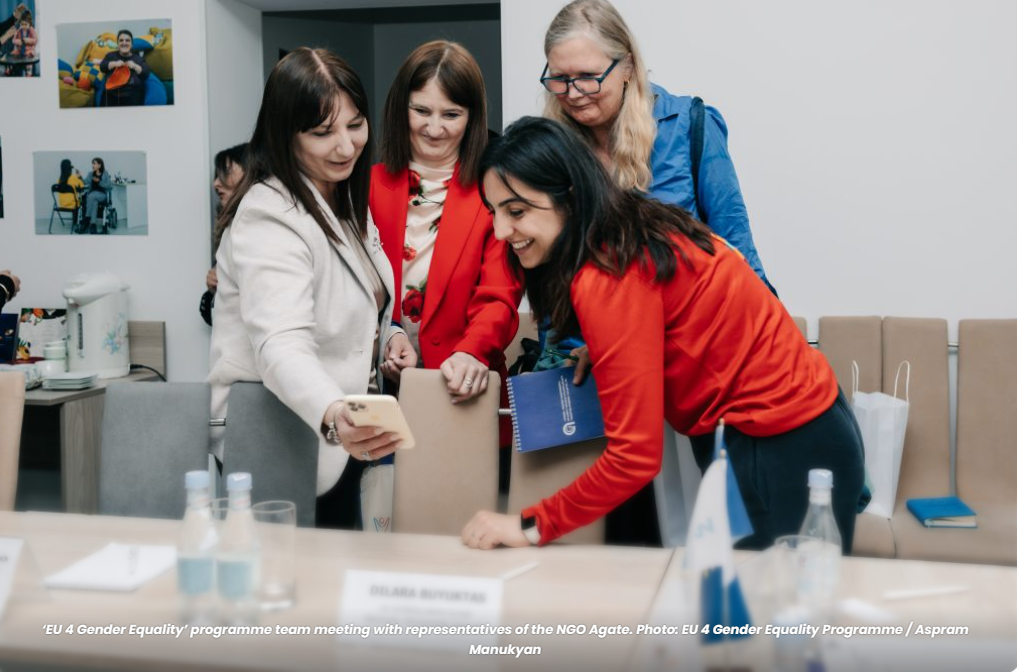“I wish all women and girls would have the courage to face challenges and claim their right to equal opportunities,” said Felicia Bulmaga, a 33-year-old woman from Moldova with a locomotor disability. Felicia was among 48 participants in a recent training designed to strengthen the independence of women and girls with disabilities, organised by the MOTIVATIE Association under the ‘EU 4 Gender Equality: Together Against Gender Stereotypes and Gender-Based Violence’ Programme, a joint initiative of UN Women and the United Nations Population Fund (UNFPA).
Over a billion people, or 16 per cent of the world’s population, experience some form of disability. The World Health Organisation reports that women are more likely to experience disability than men, with an estimated 19.2 per cent of women aged 18 and older affected, representing about one in five women. This compares to 12 per cent of men. This higher prevalence is linked to women’s longer life expectancy and several health, disease, behavioural and sociodemographic factors. As a result, the challenges faced by women with disabilities are particularly profound.
Disability, gender and discrimination are closely interlinked, with one in five women experiencing a disability-related exclusion. Women with disabilities face barriers in education, employment and community life, including inaccessible buildings, transport and services. Societies often view them as dependent or less capable, leading to stereotyping, discrimination and social stigma. These challenges combine to limit their opportunities and full participation in everyday life. At the same time, internalised stigma can reinforce self-doubt, reduce engagement in public life, and limit access to education, employment and leadership opportunities, creating additional barriers even when external support or inclusive policies exist.
Felicia Bulmaga’s story highlights how a person’s life and mindset can be transformed when they feel empowered. For the past two years, she has worked as a photographer with Chișinău City Hall, capturing key moments at public events. “This job has allowed me to grow professionally,” she recalled with enthusiasm, adding, “I have taken additional photography courses. It also gave me a certain level of independence, when I received my first pay cheque, I was overjoyed to hold my own money for the first time.”
The EU 4 Gender Equality Programme provides the tools and opportunities for women with disabilities to break down barriers and create meaningful change in their lives. By fostering open dialogue and raising awareness about disabilities in communities, schools and workplaces, the programme empowers women with disabilities to advocate for their rights and access the opportunities they deserve, helping them thrive and participate fully in society.
“I drive, I work, I take care of my home and six cats. I am a fulfilled, active woman,” said Ludmila Iachim, Executive Director of the MOTIVATIE Association in Moldova. This organisation has been working for more than two decades to improve the quality of life for people with disabilities, including through initiatives under the EU 4 Gender Equality Programme. It also focuses on preventing stigma and violence against women with disabilities, providing them with tools and support to challenge societal barriers. “Disability is not a sentence, but a challenge that makes you stronger,” Ludmila explained.
The EU 4 Gender Equality Programme has also supported women and girls with disabilities in Armenia. From 2020-2021, 32 women with disabilities were provided with access to a safe space for discussions on sexual and reproductive health, gender-based violence, available services and employment opportunities. Through online training sessions, in partnership with the Agate Rights Defence Centre for Women with Disabilities, participants improved both their well-being and their employment prospects, with many applying their new skills to start small businesses. Another 50 women and girls with disabilities were trained as local advocates to promote gender equality and inclusiveness in their communities.
“Through the project’s workshop, I found other women like me. Together, we started a small peer group. I feel proud when I see women supporting each other and realising that we are not alone – we are stronger when we raise our voices together,” said Tatev, a woman with a physical disability from the Tavush region of Armenia who participated in the training.
For many women with disabilities, societal barriers are not only external, they are also internalised. Persistent exposure to discrimination, inaccessible spaces and narrow expectations can quietly shape how they see themselves, influencing their confidence, aspirations and the choices they make.
A recent Follow-Up Assessment on Gender Norms and Stereotypes in the EU’s Eastern Partnership countries by the EU 4 Gender Equality Programme found significant shifts not only in societal attitudes but also in the ways women with disabilities who participated in the programme’s activities see themselves. For instance, only 27 per cent of participants with disabilities believe that a ‘good wife’ should never question her partner’s decisions. In sharp contrast, 80 per cent of women with disabilities who had not participated in the EU 4 Gender Equality Programme do hold this belief. Moreover, 89 per cent of participants with disabilities agree that men and women should share responsibility for providing for their families, compared to 71 per cent of non-participants. Women with disabilities who took part in the programme are also less likely to believe that conflicts between a husband and wife – even when they turn violent – should remain private. Only 35 per cent of them think others should not intervene in this situation, compared to 44 per cent of non-participants. These findings underscore the transformative impact of the programme in challenging discriminatory norms and empowering women with disabilities to champion gender equality in their communities.
“The EU 4 Gender Equality Programme brought positive changes in the lives of Armenian women with disabilities,” said Gayane Grigoryan, Programme Officer at the Agate Rights Defence Centre for Women with Disabilities, adding, “the projects implemented within the programme strived to break harmful stereotypes that prevent women and girls with disabilities from being full members of society.”
The original story published by the UNFPA


























































